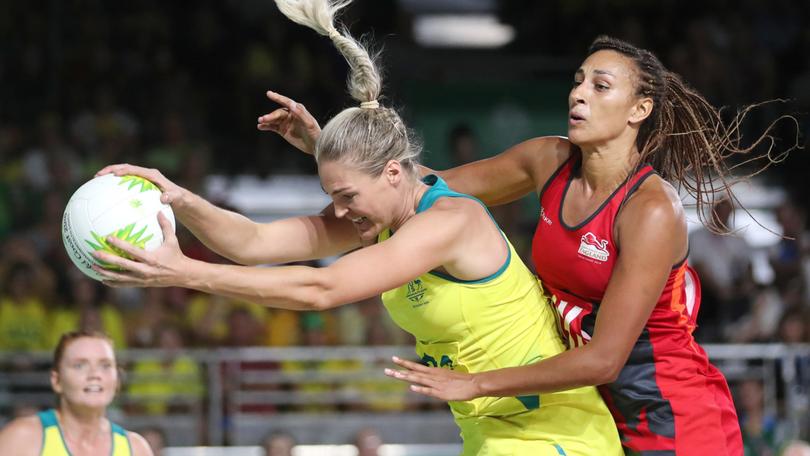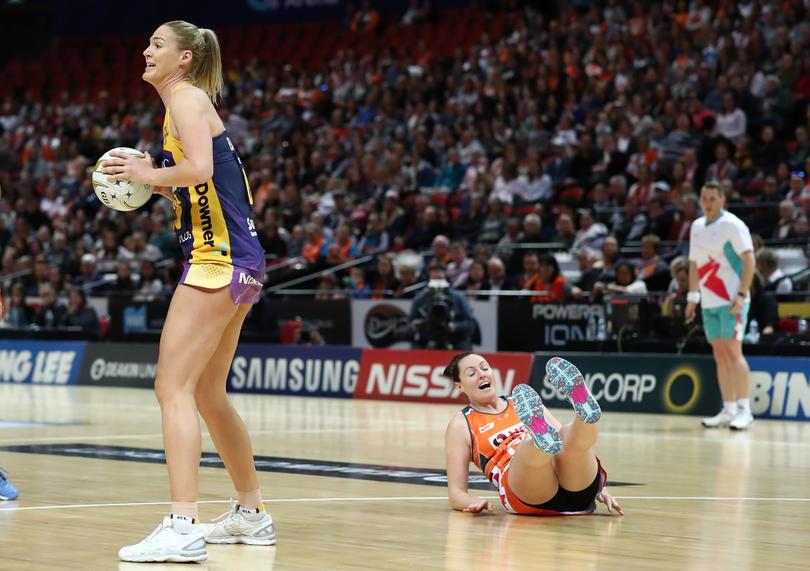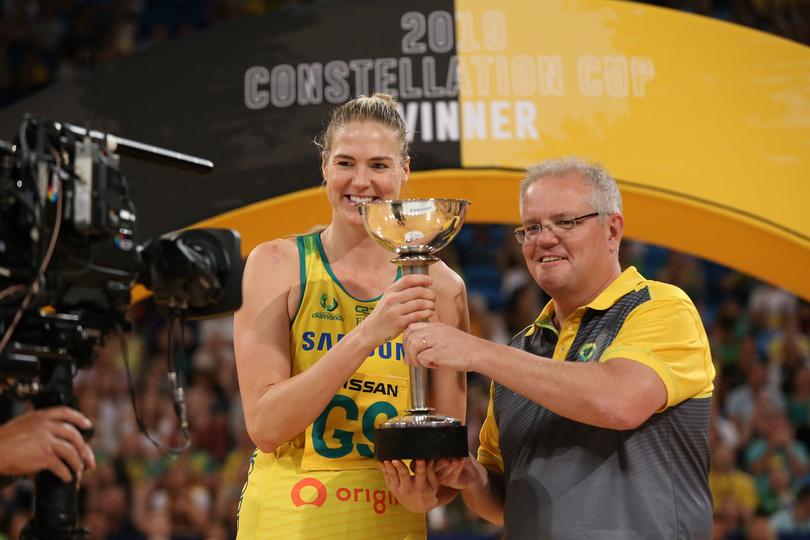Caitlin Bassett: Why my surprise netball concussion made me realise all athletes need a plan B
When you think about netball, head clashes are not often the first thing that come to mind. But I’m living proof that the concussion conundrum applies to every sport, writes Caitlin Bassett.

When you think about netball, head clashes are not often the first thing that come to mind.
We didn’t have 145kmh bouncers directed with a vengeance at our heads and we didn’t have to eyeball a footy as opponents charged in from all directions.
But every sport carries its own inherent risks — and netball is no different.
Sign up to The Nightly's newsletters.
Get the first look at the digital newspaper, curated daily stories and breaking headlines delivered to your inbox.
By continuing you agree to our Terms and Privacy Policy.The battle to protect the wellbeing of players later by protecting their heads now is a question for almost every ball sport you can think of.
It has engulfed Australian rules football for years now and was thrust into the spotlight again by Jimmy Webster’s late hit on Jy Simpkin at the weekend — just weeks after Melbourne star Angus Brayshaw was forced to medically retire.
In cricket, luckless and concussion-prone batter Will Pucovski was forced to retire hurt after yet another head knock. His future in the sport he was tipped to dominate now hangs in the balance.
I was lucky to only have two concussions during my netball career.

My first went undiagnosed for weeks. I was playing for the West Coast Fever against a good friend of mine and we were well and truly getting stuck in.
Just before half-time she cracked me at the base of my skull while attempting to go for a ball that was coming in high. My head was jerked forward and I saw stars.
When I went to the physio it was decided I simply had a bit of whiplash and was given an ice pack to put on the back of my neck.
The next day I woke up and I was cranky. I didn’t have a headache but I hadn’t slept well and was feeling lethargic.
I went about my day, trying to recover like I normally would, but the next day I still felt sluggish and foggy.
I went to the pet shop to grab some dog food and while I was there saw two kittens up for adoption. They were brother and sister and could only go as a pair. They had been there for weeks.
I am not normally an emotional person, but I cried for a week thinking about those kittens and the only thing that cheered me up was going back in to adopt them myself.
Looking back now that was a red flag — all the symptoms were there, I was just unaware, and no one at the club had picked it up either.
I was still training and playing, but I felt slow, confused and agitated. It wasn’t until I talked to a teammate and learnt she had battled similar symptoms from a concussion that I began to wonder if it was more serious than just whiplash.
My second one was more innocent and I didn’t want to admit it. I was with the Aussie team and we were in Liverpool preparing to defend our World Cup title.
At a training session I copped an elbow in the eye from a teammate. The doctor saw it happen and pulled me aside to do some tests to assess the injury.
My experiences illustrate the point that concussion can affect people in a range of different ways. Your head doesn’t have to collide with another, bounce off a surface or be hit by a ball to be at risk.
I felt fine, could rattle off the facts — day, date, time, the name of the prime minister as part of the test, but when it came to the balance tests I wobbled. Literally.
I tried to blame it on fatigue from training or jet lag but the doctor stood firm. I was told that I had to sit out for the next week and I missed our final practice match before the tournament. I was filthy. I needed that game for confidence and to secure my starting position.
I knew when I woke up the next morning the doc was right. I had a blinding headache and black eye from the knock. This time there was no escaping the fact that something wasn’t right. It took 12 days of gradual training increases before I was allowed to play again.
This is why the AFL and other leagues have brought in a mandatory head knock protocol. There is no getting out of a concussion-enforced break — and nor should there be.
My experiences illustrate the point that concussion can affect people in a range of different ways. Your head doesn’t have to collide with another, bounce off a surface or be hit by a ball to be at risk.

The vision of Brayshaw telling his teammates he was retiring, of Paddy McCartin’s final game of football and of Pucovski’s blow at the weekend are devastating. These are careers that either have or may soon be ended by concussion symptoms.
After my netball career I worked in player development. As both an athlete and a staff member I understand conversations like these can be sensitive.
It is important for the player’s family and support network to be involved in discussions just as much as they are themselves. One of the hardest things as an athlete is having to explain things to someone who is outside the bubble.
A meeting with medical staff to discuss long term treatment and can give clarity and peace of mind for concerned family and take the pressure off the athlete to have to explain the diagnosis to each individual.
I also see a network of players — both current and former — with similar experiences as being a benefit. The best support can often come from someone who has lived what the player is going through and there is something comforting about those questions being answered with real-life experience.
It’s just as important for clubs and players associations to keep athletes engaged in retirement. For those who have dedicated their entire lives to the sport, to suddenly be cut off can be disheartening. Keeping past players involved with coaching or administration roles is a great way to make them feel valued and allow them to pass on their knowledge to the next generation.
It can also help create a more gradual transition as the athlete moves into the next phase of their career, rather than going cold turkey.
For many athletes, their careers are everything and the most crucial thing post-career is building an identity away from sport.

In my experience, athletes can be resistant to spending time on activities outside their sport with the perception that if they aren’t living and breathing sport 24/7 they won’t succeed.
Professional codes are recognising the importance of mental wellbeing and its link to overall health and performance. Individual development programs are becoming an important part of athlete support and can help manage a healthy sport-life balance.
There are so many more facets to an athlete and spending time away to explore other interests can be refreshing.
I used to love going to university as an escape. There was no pressure to perform I was simply Caitlin and could develop other skills which made the thought of retirement a little less scary.
There is no way you can prepare an athlete for medical retirement but there are some methods that can help set them up from life away from the game they love.
